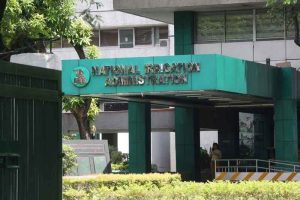
EO places irrigation agency under President’s office
PHILIPPINE President Ferdinand R. Marcos, Jr. has issued an executive order (EO) placing the National Irrigation Agency (NIA) under the Office of the President from the Department of Agriculture (DA).
Under EO No. 69, which was signed on Sept. 5 and released on Tuesday, the irrigation agency would be transferred to the Office of the President to “streamline and rationalize the functional relations of agencies… in order to promote coordination, efficiency and coherence within the bureaucracy,” based on a copy of the order uploaded to the Official Gazette.
The agency had been under the Office of the President since it was established in 1963, before being moved to the DA in 1992.
“Irrigation management and development are vital towards achieving food security and ensuring infrastructure development in the country, which are among the Administration’s priority initiatives,” according to the EO.
Philippine Senators have chided the NIA for slow progress in state irrigation efforts, as they also raised concerns about rigged public bidding in carrying out its projects.
NIA Administrator Eduardo G. Guillen has said his agency only completed 68% of its national irrigation development commitments as of last year, servicing an estimated 2.11 million hectares, with 1.1 million hectares yet to be irrigated.
Mr. Marcos also ordered the Governance Commission for government-owned or -controlled corporations to study the reorganization of the NIA board of directors.
Agriculture Secretary Francisco P. Tiu Laurel, Jr. welcomed what he described as a “strategic move” to attain a modern and more productive farm sector.
“Under normal circumstances, NIA should be under the DA,” Secretary Tiu Laurel said in a statement.
“However, given the urgent need to irrigate over a million hectares of land to boost agricultural productivity, especially for rice, President Marcos made a strategic—possibly a game-changing—move that would ensure that NIA receives the substantial funding necessary to fulfill this crucial mandate swiftly.”
Mr. Tiu Laurel said the transfer will address the urgent need for substantial funding to irrigate approximately 1.2 million hectares of land. He noted that the DA had proposed a budget of P512 billion for next year, which includes plans to roll out more irrigation projects. This was however reduced to P200 billion in the National Expenditure Plan for 2025.
In transferring the NIA, Mr. Tiu Laurel said the government is aiming to mobilize additional funds to accelerate irrigation projects and improve agricultural outcomes. This is expected to “significantly” enhance food production, particularly rice.
Under next year’s proposed P6.352-trillion national budget, P24.6 billion will go to irrigation services.
In his third address to Congress, the President pushed for more irrigation dams and bulk water projects to ensure sources of usable water for local communities.
A farmers group, however, questioned the intention of the NIA transfer. “If the goal is to advance the irrigation system to help ensure the country’s food security, why move it?” Bantay Bigas Spokesperson Cathy L. Estavillo said in a Viber message in Filipino.
“He could direct the NIA to fulfill its mandate and programs, such as ensuring that funds are used for irrigation canal development and implementing free irrigation for all Filipino farmers.”
She added that, the privatization of dams has intensified, benefitting only private entrepreneurs and foreigners. — John Victor D. Ordoñez with reports from Adrian H. Halili



